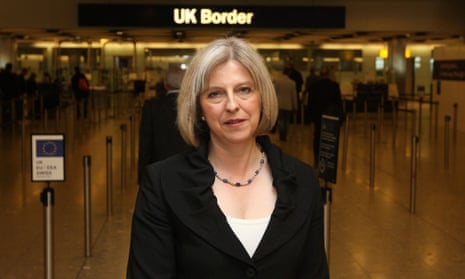Theresa May appeals to a stereotype that has a deep grip on the English psyche. Sober and commonsensical, she behaves with the moral seriousness we expect from a vicar’s daughter. She may be a little clunky, but what a relief it is to have a straightforward leader from the heart of the country after the flash, poll-driven phonies of the past.
I am not saying her public image is all a pretence. No focus group told her to campaign against the modern slave trade when she was home secretary. There were few Tory votes in stopping the police targeting young black men, either. But the dominant side of Theresa May is more superficial than David Cameron and more dishonest than Tony Blair. It is a tribute to the power of cliches to stop us seeing what is in front of our noses, that so few have noticed that the only reason she’s prime minister is that she put ambition before principle.
Last week, Downing Street spin doctors were trying and failing to downplay the importance of a secret speech she gave to Goldman Sachs on 26 May, which was leaked to Nick Hopkins and Rowena Mason of the Guardian. In private, May was unequivocal. “The economic arguments are clear,” she told the bankers. Companies would leave the UK if the UK left the EU. In public, however, she made just one speech during the referendum campaign. You forgot it the moment you heard it. May never mentioned the danger of companies fleeing. Her economic case, such as it was, came down to a flaccid, pseudo-impartial argument that “there are risks in staying as well as leaving”.
As an orator, May was hopeless. As a politician on the make, she was close to perfect. When Craig Oliver, Cameron’s former chief of communications, wondered if she was secretly an “enemy agent” for the Leave side, he was being too Machiavellian. May was just making the smart move. She kept her views about the economic consequences of Brexit quiet, so that the Conservative right would accept her as leader if Cameron lost.
Failing to state your honest opinion on the most important decision Britain has taken in decades may seem cowardly enough. But the consequences of May’s pretence do not stop with one referendum.
Her manoeuvres have forced her into a position where she must make arguments she cannot possibly believe, on behalf of causes she cannot possibly believe in. Her behaviour shows that, far from “taking back control”, Brexit is depriving us of the ability to take decisions, giving privileges to the special interests the Leave campaign claimed it was fighting against, and imposing burdens on the taxpayer far greater than the mythical £350 million a week that Vote Leave said we sent to Brussels.
Example: May opposed a new runway for Heathrow. Maybe she was just thinking about her constituents whose peace will be wrecked. Maybe she was worried about cramming an expanded airport into a dangerously overcrowded corner of London. The point, post-Brexit, is surely that the environmental or logistical arguments no longer matter. As her government admitted, May had to approve Heathrow to prove to sceptical markets that she had a “commitment to keeping the UK open for business now and in the future”.
Her objections to the Hinkley Point nuclear power station were just as reasonable. Chinese investment threatened handing control of a part of our energy supply to a potentially hostile foreign power. As pertinently, Hinkley’s proposed reactor is fantastically expensive and next to impossible to build. (A forerunner in Finland is nine years behind schedule and €5.2bn over budget.)
When May called in the decision to go ahead with Hinkley, she looked like the proud prime minister of the newly independent nation that Vote Leave promised us. Until, that is, Xinhua, the official news agency of the Chinese Communist party, explained Britain’s new place in the world. “A kingdom striving to pull itself out of the Brexit aftermath” could not afford to “deter possible investors from China”, it warned. After a brief moment of defiance, the submissive May agreed.
Her defenders say that she is responding to the will of the British people. I won’t go on about how a 52-48 vote was hardly the people speaking as one. Instead, you should understand her by looking at how, after abandoning her beliefs, May refused to level with the public and confront them with the hard choices ahead. Rather than speak plainly, she has embraced the Leave campaign’s big lie that Brexit will be painless.
To maintain the illusion, her ministers scramble in secret meetings to cut deals with special interests. Whatever bribes they have offered Nissan will only be the start. Farmers, the City and corporations with muscle will all want taxpayers’ money to compensate them for their losses. The bill will be picked up by small businesses, which cannot afford lobbyists and, of course, by the taxpayers, who will fund the right’s illusion that we can have Brexit without pain.
As I said, May had the reputation as a reforming home secretary and some of that reputation was deserved. But as she presides over an upsurge in racial violence and the gobby resurgence of ignorant-and-proud-of-it nationalism, it’s worth remembering another moment in her time at the Home Office, which shows how willing she is to live with lies.
You can trace the origins of today’s yobfest to 2013, when the right manufactured a pseudo scandal about “health tourists” exploiting the dear old NHS. Pressed by the BBC to say how much money thieving foreigners were stealing from the health service, May could not give an honest reply, for the Royal College of GPs had already explained that the supposed “problem barely existed”.
May did not care. The perception that there was a scandal mattered more to her than the reality that there was none. The electorate had the “feeling that people who are here illegally were accessing services”, she said, so she must maintain the pretence.
Now she is a prime minister of pretences, running a government where feelings matter more than fact. She pretends that we should leave the EU, even though she knows we should remain a member of the single market. She offers us the illusion that we are taking back control, even as we lose our freedom to act. She cuts deals in secret, in the hope that the public will never realise that her land of make-believe is an expensive place to live.

